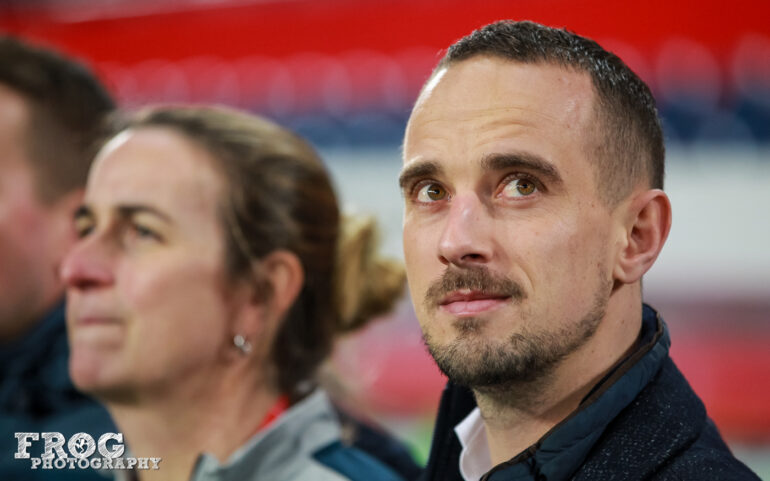Editor’s note — Eni Aluko has accused England manager Mark Sampson of making racist remarks. A parliamentary inquiry is under way regarding The Football Association (FA)’s handling of two prior investigations stemming from Aluko’s initial complaint. The Guardian’s Daniel Taylor has more on the entire situation. Here, Richard Laverty was on site for Sampson’s press conference ahead of England’s World Cup qualifying clash against Russia on Tuesday, September 19.
England manager Mark Sampson continued to deny making any comments about Ebola at St. George’s Park on Tuesday, but appeared to contradict himself when questioned over whether he had ever had a conversation with Eni Aluko on the topic.
Sampson’s side faces Russia at Prenton Park next week, but a dark cloud continues to hang over the 34-year-old as a resolution to the saga appears no closer. Aluko alleges Samspon made racial comments
Asked if the situation had overshadowed the buildup to the start of England’s march to France in two years’ time, Sampson said: “It’s a difficult situation for everyone to be in. The players are fully aware of the circumstances, I updated the players on Sunday night and the players, the staff, and myself want to move on and focus on the football.”
While players within the squad continue to support their manager, Sampson said he would “encourage” his players to speak up if they felt there were any issues.
“If they felt something wasn’t right, we would encourage our players to speak up — whether in the team or out of the team.
“Over the course of the last three-and-a-half years, one of our biggest focuses has been to create an environment where the players can take ownership and take responsibility to drive the environment forward.”
Sampson added, “For that to happen, there has to be a strong element of communication, players to players, staff to staff, and staff to players. I firmly believe that is the case, I can’t believe for this team would have moved to third in the world, to have got to two consecutive semifinals that my selection decisions would have been terribly wrong or the environment would have been positive.”
Throughout the press meeting, Sampson’s message was clear, he had cooperated fully with what he called a “thorough investigation” and that he couldn’t or wouldn’t speak on behalf of Aluko or Chelsea teammate Drew Spence when asked about the allegations made against him. But when asked if he would be happy if an investigation had only spoken to the players and not him, as opposed to the other way around, he was non-committal, reaffirming his previous message about the investigation.
When asked if Aluko was a difficult player to work with, the manager said, “Every player I have worked with at times has been challenging — in a positive and negative way. Eni has got an incredible record in terms of caps won and she played a part in moving our team to where we are today. I still respect her now in all she has achieved for us.”
He also stuck by his statement that he would consider Aluko for future squad selections.
“When I made a statement that I would consider Eni for selection, that was the case and is the case. My responsibility is to be a professional manager and do what I feel is right for the team. I’m completely aware a lot has gone on over the last six months and a lot needs to happen for that to be case, but I wouldn’t rule it out.”
Sampson also reaffirmed he was “open” to a conversation with Aluko, but did add that Aluko wasn’t “being considered for selection at the moment.”
Despite wavering on certain topics, Sampson continued to deny making either of the comments against Aluko or Spence.
“I can’t talk about something I didn’t say,” he said. “What I can control is what is asked of me, it’s not right for me to say whether Eni has lied or not. I didn’t say either of the allegations.
“I have thought about this [why the players would lie] over the last six months and the answer, if it had come to me I would be in a position to understand, but I don’t know. All I know is that I responded by saying that it didn’t happen, I didn’t say those things. How they feel about it, why they brought it up, I can’t answer that. I have made it clear that I am not a racist, my selection decisions are really clear, if we are not successful on the field I won’t be in the job for a long period of time.”
Sampson also confirmed he hadn’t given thought to resigning, saying he “loves this job” and is “very proud to be England manager.”
The key moment came at the end of the thirty-minute session, when Sampson appeared to contradict evidence he’d given in the inquiry. Sampson gave evidence of a conversation which took place at the 2015 Women’s World Cup between himself, Aluko, and several other people, but stated he “couldn’t remember any particular conversation” when quizzed about it on Tuesday afternoon.
When pressed, he continued to state he couldn’t remember a conversation about Ebola, but did later concede he’d told the investigation about a different conversation, but stated, “I wouldn’t be willing to elaborate on what was a confidential process.”
It’s a situation that continues to leave more questions than answers as England heads toward next Tuesday’s game, and it doesn’t appear to be close to a resolution either way.
The mood at St. George’s Park was a positive one, with the players getting on with their business as usual and continuing to defend their manager when asked about the subject, but the parliamentary inquiry can’t come soon enough.

